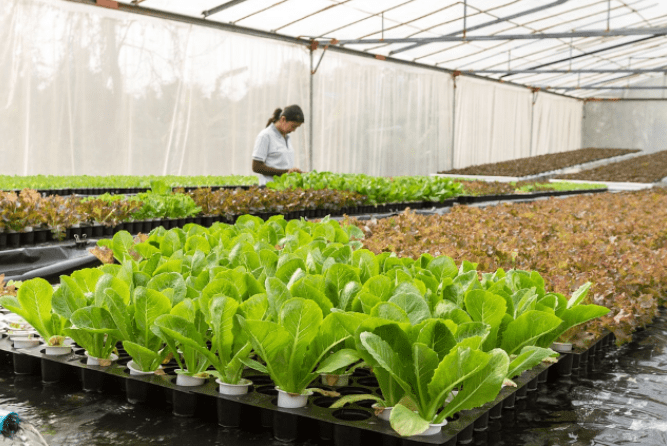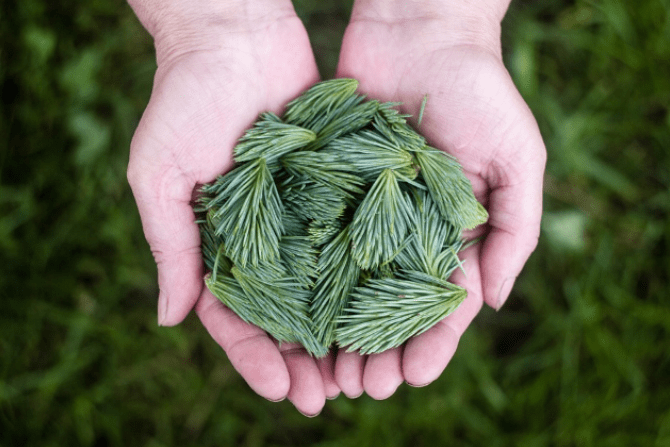Introduction: The Benefits of Organic Agriculture
The health food movement in the United States and around the world is continually gaining support and followers. One of the most important aspects of healthy living and eating is through consuming organic foods. Because of this consumer preference, organic agriculture has taken off in recent years.
Not only are there benefits of organic farming for the consumer, but organic farmers and growers are finding that there are also a number of different market advantages to organic agriculture.
Unfortunately, many people don’t actually have a working organic farming definition, and many food products that are billed as organic may actually be grown with a certain number of pesticides.
In this brief article, AdvisoryHQ will look at the organic farming advantages and disadvantages, both for the organic farmer and for the health food advocate. We will begin by looking at the organic farming definition, comparing the common-sense idea of organic agriculture to the USDA organic farming definition.
We then turn our attention to the advantages of organic farming, including the benefits of organic farming both to the farmer and to the consumer. To offer an unbiased opinion, we also look at the disadvantages of organic farming both for the farmer and the consumer.
Finally, we try to go beyond organic farming advantages and disadvantages to explore why organic agriculture may hold the keys to help our society confront some of our most urgent problems. We end by offering a list of organic farming pros and cons to help the organic farmer decide whether or not organic agriculture is a profitable alternative for him or her.
See Also: Top Secured Credit Cards | What is a Secured Credit Card? Guide, Rankings, and Reviews
What Is a Simple Organic Farming Definition?
Chances are that in recent years you have found that the “organic” aisle in your local grocery store is beginning to expand. Instead of just a few scattered products hidden on some back shelf, most supermarkets today have expanded the number of organic products they sell because of growing demand.



What is Organic Farming?
Other grocery stores, like Whole Foods, are entirely devoted to selling organic, wholesome foods. The proliferation of the local food movement and farmer’s markets offers new markets to the organic farmer while also giving health-conscious consumers an opportunity to consume fresh, organic produce grown in their communities.
Despite a large amount of interest in organic agriculture, many people simply don’t know what an organic farming definition is. To add to the confusion, many different governmental and private organizations have their own organic farming definition, which may be significantly different. Below we offer the organic farming definition offered by three different important players in the organic agriculture movement.
- USDA: The United States Department of Agriculture has its own organic farming definition that they use to determine which foods can carry the “USDA certified organic” label that you have probably seen in grocery stores. The organic certification process is quite strict while their organic farming definition is quite broad: “a production system that is managed to respond to site-specific conditions by integrating cultural, biological, and mechanical practices that foster cycling of resources, promote ecological balance, and conserve biodiversity.”
- SARE: The organic farming definition offered by the Sustainable Agriculture Research and Education Center says that organic agriculture uses “nature as a model for the agricultural system – recycling nutrients, encouraging natural predators to manage pests, increasing plant densities to block weeds – organic farmers don’t merely substitute non-toxic materials for pesticides and fertilizers, but rather consider the farm as an integrated entity, with all parts interconnected.”
- The European Commission on Agriculture and Rural Development also has its own sets of guidelines and its own organic farming definition: “Organic farming is a way of producing food that respects natural life cycles.It minimizes the human impact on the environment and operates as naturally as possible.”
Don’t Miss: Top Credit Cards for College Students| Ranking | Best College Student Credit Cards
All-in-One Change Management Tools
Top Rated Toolkit for Change Managers.
Get Your Change Management Tool Today...
The Advantages of Organic Farming
From the perspective of the organic farmer, there are a number of important advantages of organic farming. Firstly, in the United States, Canada, and other developed nations, consumer demand for locally produced products grown through organic agriculture techniques offers a niche market where organic farmers and growers can demand a premium price.
For example, a pound of tomatoes grown using more traditional, chemical inputs might only fetch $1 per pound or less when sold in bulk to a middle man. That same pound of tomatoes grown using organic agriculture techniques and sold at a local farmer’s market might be able to be sold for upward of $4 a pound.
One of the most important advantages of organic farming, then, is that many organic farmers and growers can sell directly to consumers through different direct commercialization opportunities. Farmer’s markets are the most common, and even many small towns now have several farmer’s markets where the organic farmer can sell his or her produce.
Community-supported agriculture programs, or CSAs, offer other unique advantages of organic farming to the organic farmer. With these agreements between producer and consumer, a group of consumers agrees to subsidize the production of an organic farmer or a group of organic farmers and growers.
They in turn receive a weekly or bi-weekly basket of fresh, in-season produce and farm products. An organic farmer who sells to a CSA, then, will basically be able to avoid getting loans from the bank for their production through consumer subsidies.
Lastly, organic agriculture also is fundamental in helping organic farmers and growers protect the soil that gives them the fertility their crops need. Modern-day agriculture with its dependence on huge applications of chemical pesticides and fertilizers effectively destroys the life and fertility of the soil, making the farmer depend even further on expensive and sometimes dangerous chemical products.
One of the most meaningful advantages of organic farming to organic farmers and growers, then, is that these growing techniques allow them to recuperate the life of the soil and reduce exposure to a number of chemicals that cause damage to the land and to their physical health.
Related: Top Credit Cards for Students with No Credit or Bad, Poor or No Credit History
The Disadvantages of Organic Farming
Organic farming advantages and disadvantages are rarely compared. While many people know of the advantages of organic farming, few people take into consideration some of the disadvantages of organic farming.
One of the disadvantages of organic farming from the perspective of organic farmers and growers is that organic agriculture is much more labor-intensive. Since organic agriculture doesn’t allow for the widespread use of chemical inputs such as herbicides, that means that the organic farmer must dedicate more time to manually deal with weeds.
Whereas conventional farmers simply spray their fields with glyphosate, or “Round-Up Ready,” organic farmers and growers must dedicate time to manually deal with weeds or come up with other natural and biological controls for pests and weeds.
From the perspective of the consumer, organic farming advantages and disadvantages are pretty easily identified. While organic food products are obviously much healthier, the price of organic food is often an issue for low-income people.
For people on a tight budget, paying $4 for a pound of organic tomatoes might not be feasible. Of the main disadvantages of organic farming for the consumer, then, is the high price that these types of products demand.
Popular Article: Top First Credit Card for Young Adults, Teenagers, First-Timers & Beginners | Ranking and Comparison
Beyond Organic Farming Advantages and Disadvantages
Besides offering health benefits and economic opportunities for organic farmers and growers, organic agriculture is often considered to be the only feasible alternative for our future food needs. Beyond the apparent organic farming advantages and disadvantages, we need to understand the challenges that conventional, fossil fuel-dependent agriculture will face in the coming years and decades.
Conventional agriculture depends almost entirely on petroleum to get the food that we need to our tables.
From the massive tractors and combines that till the fields, to the synthetic, oil-based, chemical fertilizers that make the plants grow, to the trucks and planes that distribute the food around the world, without petroleum, it would be impossible for us to grow food and move it around the world as we currently do.
As we reach peak oil, we need to begin to question whether or not that model of agriculture is sustainable. Beyond the organic farming advantages and disadvantages to the farmer and consumer, organic agriculture offers a sustainable alternative to grow our food without excessive dependence on unrenewable resources.



The Benefits of Organic Agriculture
A recent UN report titled “Wake up Before It’s Too Late” found that “major changes are needed in our food, agriculture and trade systems, with a shift toward local small-scale farmers and food systems recommended.” This report calls for the expansion of organic agriculture, including diversifying farms and reducing the use of fertilizers and fossil fuel inputs.
Organic Farming Pros and Cons for Organic Farmers and Growers
If you are an organic farmer considering the organic farming advantages and disadvantages, below you will find a list of the organic farming pros and cons to help you decide on the best growing option for you.
Organic Farming Pros and Cons
| Advantages of Organic Farming | Disadvantages of Organic Farming |
| Commands better price | Requires extra labor |
| Ability to find niche markets | May take time to transition out of a chemical farming model |
| Protects the soil | Organic certification process can be expensive and time-consuming |
| Reduces dependence on chemical inputs | Requires learning new skills and techniques |
| Not dependent on fossil fuels | You may have a hard time finding a way into the organic agriculture niche markets |
| Can be profitable on a small acreage | During the learning process, you may suffer losses |
| Allows for direct commercialization to consumers | Not always possible on large acreage |
| Allows you to produce healthier, more nutrient-rich food |
Read More: Top Military Credit Cards | Ranking | Best Credit Cards for Military (Active & Veterans)
Conclusion – The Benefits of Organic Farming and Organic Agriculture for Healthier People and a Healthier Planet
The benefits of organic farming and organic agriculture are well documented. The growth of the local food movement seen in the proliferation of farmer’s markets, community-supported agriculture programs, and other producer-to-consumer commercialization methods give testament to the growing popularity of organic agriculture.
Furthermore, the fact that even the large supermarket chains have begun to offer a wide variety of organic products is another sign that more and more people have come to appreciate the benefits of organic agriculture.
In this short article, we have attempted to give you a clear and concise organic farming definition while also looking at the organic farming advantages and disadvantages.
While it may take time to transition into an organic agriculture model, the health and ecosystem benefits of organic agriculture are many and varied.
Beyond the organic farming advantages and disadvantages, however, lies the question of how we will go about producing food for our growing population in a sustainable manner.
Our dependence on fossil fuels to grow the food we need is neither sustainable nor entirely safe. Finding ways to transition into more widespread organic agriculture methods, then, is one of the most urgent and pressing tasks that we collectively face.
- https://pixabay.com/photos/conservatory-agriculture-aquaculture-1782437/
- https://pixabay.com/photos/pine-leaves-green-hands-holding-691639/
AdvisoryHQ (AHQ) Disclaimer:
Reasonable efforts have been made by AdvisoryHQ to present accurate information, however all info is presented without warranty. Review AdvisoryHQ’s Terms for details. Also review each firm’s site for the most updated data, rates and info.
Note: Firms and products, including the one(s) reviewed above, may be AdvisoryHQ's affiliates. Click to view AdvisoryHQ's advertiser disclosures.







